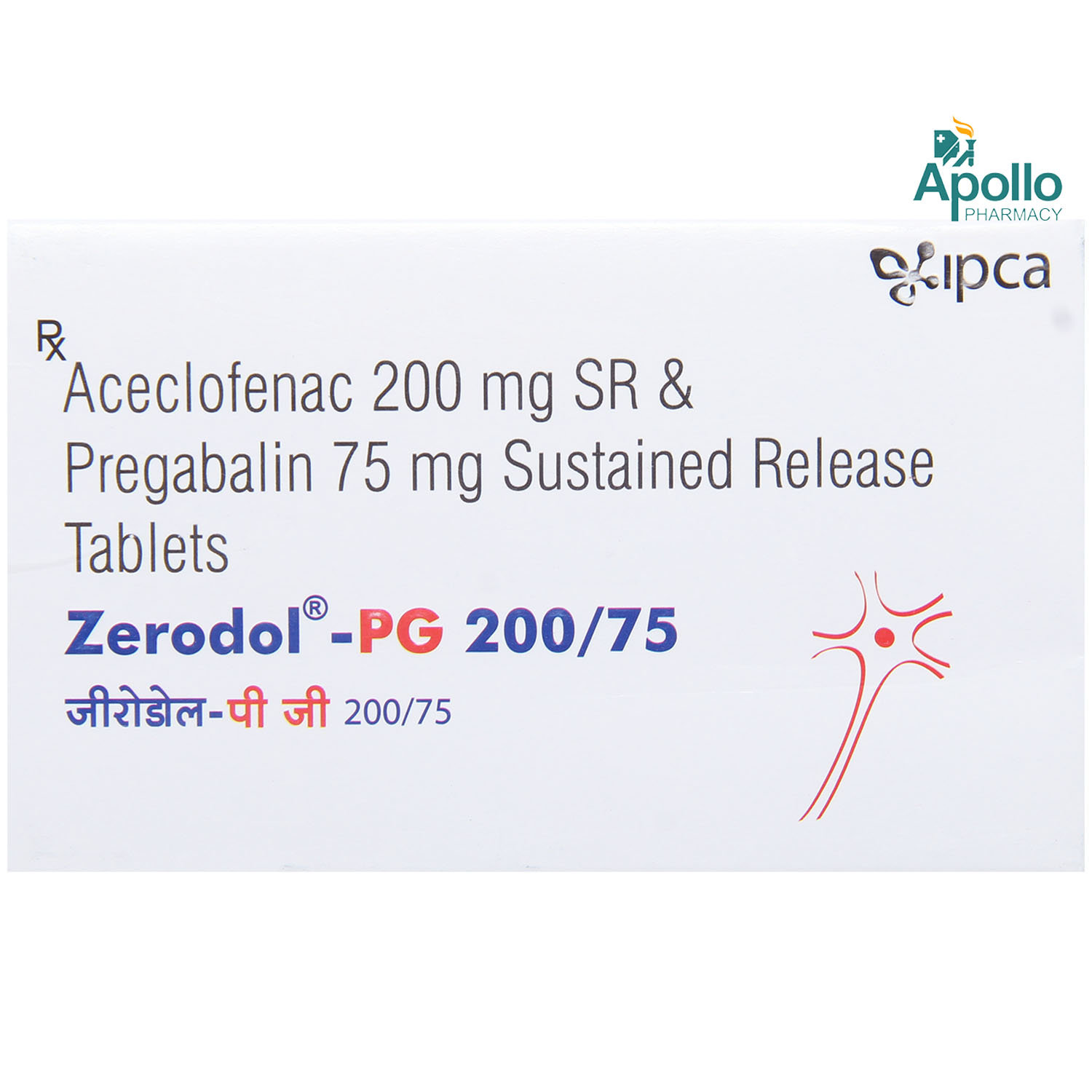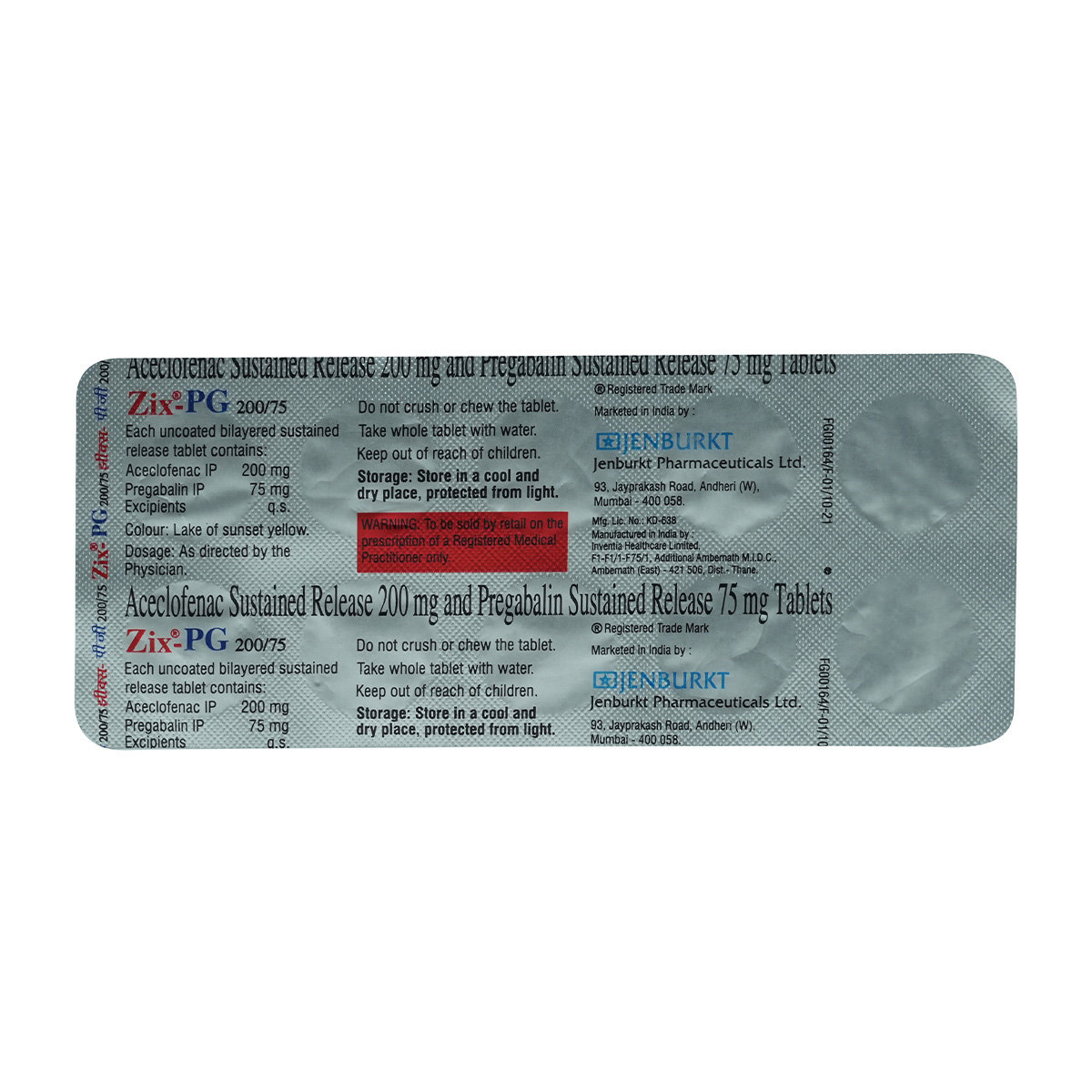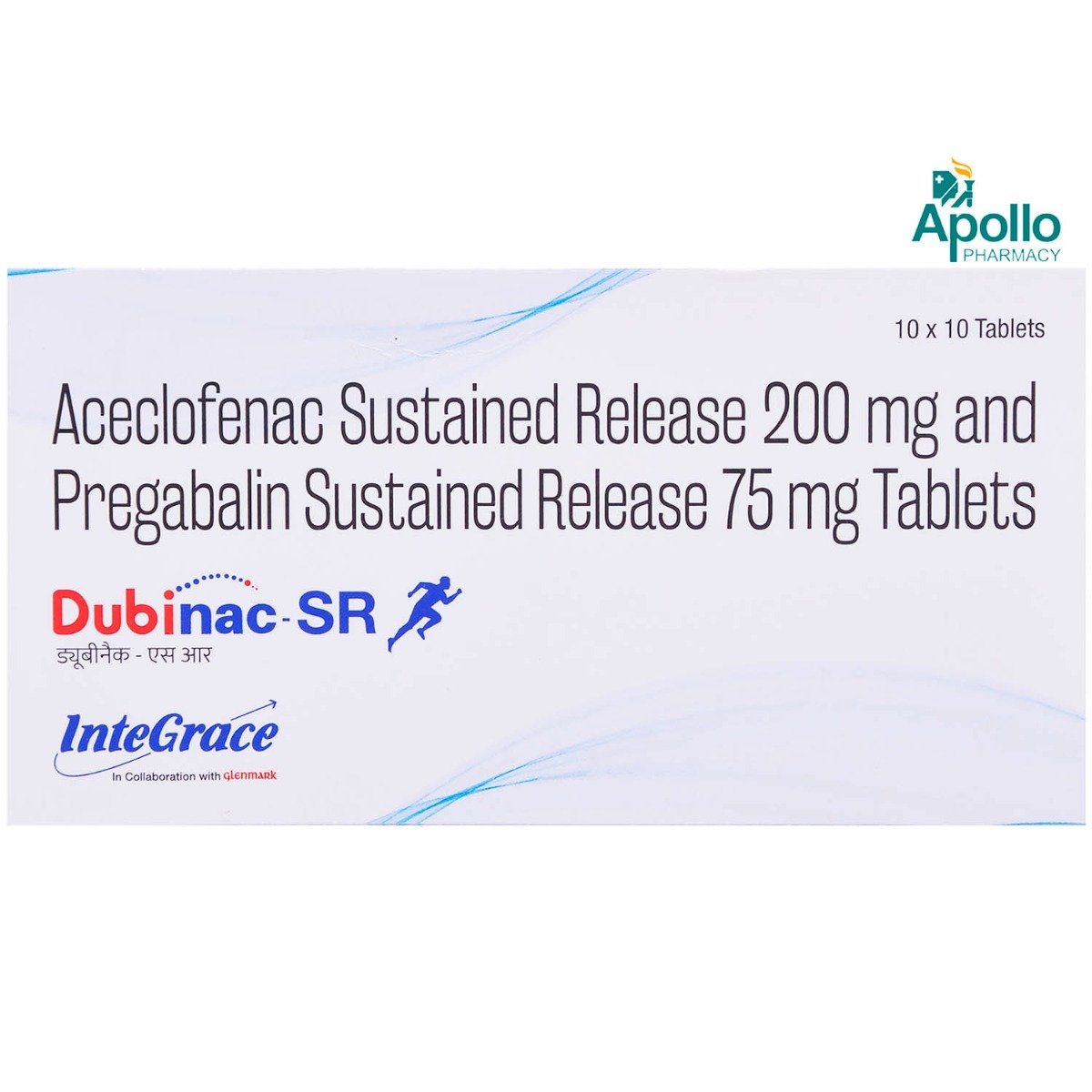Hynac-PG Tablet 10's

(Inclusive of all Taxes)
Get Free delivery (₹99)
Provide Delivery Location
Online payment accepted
 Prescription drug
Prescription drugWhats That
Composition :
Manufacturer/Marketer :
Consume Type :
Return Policy :
About Hynac-PG Tablet 10's
Hynac-PG Tablet 10's is a combination medicine used for the management of neuropathic pain. Neuropathic pain is a chronic progressive nerve disease that causes nerve pain due to nerve damage or a malfunctioning nervous system. The pain could be intermittent or continuous, which is felt as a prickling, stabbing, tingling, or burning sensation.
Hynac-PG Tablet 10's is a combination of two drugs: Pregabalin (anti-convulsant), and Aceclofenac (NSAID). Pregabalin works by changing how nerves send messages to your brain. Aceclofenac works by blocking the effect of a chemical messenger known as cyclo-oxygenase (COX) enzyme that makes another chemical 'prostaglandins' (PG). Prostaglandins play an important role in controlling pain and inflammation. By blocking the effect of COX enzymes, lesser PGs are produced. This reduces mild to moderate pain and inflammation at the injured or damaged site decreasing stiffness in joints. Together, Hynac-PG Tablet 10's helps to treat neuropathic pain (pain due to nerve damage).
Take Hynac-PG Tablet 10's as prescribed. You are advised to take Hynac-PG Tablet 10's for as long as your doctor has prescribed it for you depending on your medical condition. In some cases, you may experience certain common side effects such as nausea, vomiting, stomach pain, diarrhoea, loss of appetite, heartburn, dryness in the mouth, dizziness, sleepiness, and uncoordinated body movements. Most of these side effects do not require medical attention and will resolve gradually over time. However, you are advised to talk to your doctor if you experience these side effects persistently.
Please do not stop taking Hynac-PG Tablet 10's without consulting your doctor as it could cause withdrawal symptoms. Do not take Hynac-PG Tablet 10's if you are pregnant or breastfeeding unless prescribed by the doctor. Women of childbearing potential should use effective contraception. Hynac-PG Tablet 10's causes drowsiness and dizziness, so drive only if you are alert. Hynac-PG Tablet 10's should not be given to children as safety and effectiveness have not been established. Avoid consuming alcohol along with Hynac-PG Tablet 10's as it could lead to increased dizziness and sleepiness. Keep your doctor informed about your health condition and medicines to rule out any side effects. Before taking this medicine inform your doctor have a history of heart disease, severe kidney disease, disorders of the stomach or gut/bowel, and diabetes.
Uses of Hynac-PG Tablet 10's
Directions for Use
Medicinal Benefits
Hynac-PG Tablet 10's is a combination of two drugs: Pregabalin (anti-convulsant), and Aceclofenac (NSAID's). Pregabalin belongs to a group of medications called 'anticonvulsants' used to prevent neuropathic pain (pain due to damaged nerves), fibromyalgia (musculoskeletal pain), and epilepsy (fits). It works by calming the damaged or overactive nerves in your body that may cause pain or seizures, thereby decreasing the number of pain signals sent out by damaged nerves in the body. Overall it reduces the pain which has been damaged or irritated due to conditions like chronic conditions, diabetes, trauma, or epilepsy. Aceclofenac belongs to a group of medicines called Non-Steroidal Anti-Inflammatory Drugs (NSAIDs) used to reduce and relieve pain, redness, and inflammation (swelling) in patients suffering from osteoarthritis, rheumatoid arthritis, and ankylosing spondylitis. Hynac-PG Tablet 10's works by blocking the effect of a chemical messenger known as cyclo-oxygenase (COX) enzyme that makes another chemical 'prostaglandins' (PG). These prostaglandins are produced at injury sites and cause pain and swelling. By blocking the effect of COX enzymes, lesser PGs are produced. This helps in reducing mild to moderate pain and inflammation at the injured or damaged site. Together, Hynac-PG Tablet 10's helps to treat neuropathic pain (pain due to nerve damage).
Storage
Drug Warnings
Inform your doctor before taking Hynac-PG Tablet 10's if you have heart problems, bipolar syndrome, severe liver disease or porphyria, diabetes, and asthma. Please do not stop taking Hynac-PG Tablet 10's without consulting your doctor as it could cause withdrawal symptoms. Do not take Hynac-PG Tablet 10's if you are pregnant or breastfeeding unless prescribed by the doctor. Hynac-PG Tablet 10's causes drowsiness and dizziness, so drive only if you are alert. Hynac-PG Tablet 10's should not be given to children as safety and effectiveness have not been established. Avoid consuming alcohol along with Hynac-PG Tablet 10's as it could lead to increased drowsiness and sleepiness. Consult your doctor immediately if you experience suicidal tendencies such as killing or harming yourself. Hynac-PG Tablet 10's contains Pregabalin, which can decrease sperm count and may affect fertility in men. Do not exceed the prescribed dose or duration of treatment.
Diet & Lifestyle Advise
- Include food rich in vitamins B and D in your diet.
- Include cayenne pepper in your diet as it can help in lowering neuropathic pain.
- Exercising regularly helps in improving overall health and combating pain.
- Rest well, and get plenty of sleep.
- Try taking a warm bath as it can be soothing.
- Avoid smoking and alcohol consumption.
- Meditation and yoga can help lower stress, decrease pain sensitivity, and improves coping skills.
- Acupuncture can be helpful by stimulating pressure points.
- Using essential oils for massages can help increase circulation.
Side Effects of Hynac-PG Tablet 10's
- Nausea
- Vomiting
- Stomach pain
- Diarrhoea
- Heartburn
- Dryness in mouth
- Dizziness
- Blurred vision
- Weight gain
- Sleepiness
- Tiredness
- Uncoordinated body movements
Habit Forming
Therapeutic Class
Product Substitutes
FAQs
Hynac-PG Tablet 10's is a combination of two drugs: Pregabalin (anti-convulsant), and Aceclofenac (NSAID). Pregabalin works by changing how nerves send messages to your brain. Aceclofenac work by blocking the effect of a natural chemical messenger called cyclo-oxygenase (COX) enzymes that make another chemical (prostaglandins). These prostaglandins are produced at sites of damage or injury and cause inflammation and pain. Together, Hynac-PG Tablet 10's helps to treat neuropathic pain (pain due to nerve damage).
Hynac-PG Tablet 10's may cause weight gain due to an increase in appetite. Maintain a healthy weight by regular exercise and following a proper diet.
Dry mouth could be a side-effect of Hynac-PG Tablet 10's. Limiting caffeine intake, avoiding smoking and mouthwashes containing alcohol, drinking water regularly, and chewing sugar-free gum/candy might stimulate saliva and prevent drying of the mouth.
Do not discontinue Hynac-PG Tablet 10's without consulting your doctor as it could lead to withdrawal symptoms. To treat your condition effectually continue taking Hynac-PG Tablet 10's for as long as prescribed. Do not be reluctant to speak with your doctor if you feel any difficulty while taking Hynac-PG Tablet 10's; your doctor will reduce the dose gradually.
Hynac-PG Tablet 10's is used to treat neuropathic pain due to diabetic neuropathy. Diabetic neuropathy is a condition in which nerve damage occurs due to high blood glucose levels. It mostly damages the nerves in legs and feet.
Drug-Drug Interactions Checker List
- PIOGLITAZONE
- ROSIGLITAZONE
- BENAZEPRIL
- CAPTOPRIL
- ENALAPRIL
- FOSINOPRIL
- LISINOPRIL
- MOEXIPRIL
- PERINDOPRIL
- QUINAPRIL
- RAMIPRIL
Special Advise
- Hynac-PG Tablet 10's can make you feel dizzy or drowsy, try to get up slowly while rising from a sitting or lying position.
- Hynac-PG Tablet 10's can cause dry mouth, so in that case, you can drink water or fluids, suck hard candy or ice, chew (sugarless) gum, or use a saliva substitute.
Disease/Condition Glossary
Neuropathic pain: Neuropathic pain is caused due to damage to sensory nerves. It is caused by chronic progressive nerve disease, or due to infection or injury. The pain could be intermittent or continuous, which is felt as a prickling, stabbing, tingling, or burning sensation. A feeling of numbness and loss of sensations is also common with neuropathic pain. Usually, the body sends the pain signals when there is an injury, but with neuropathic pain, the pain is not triggered by an injury, the body unpromptedly sends the pain signals. Symptoms include spontaneous, untriggered pain, unpleasant feeling, shooting, burning or stabbing pain, difficulty resting or sleeping, and evoked pain (pain caused by events usually not painful).

Have a query?
Buy best C.n.s Drugs products by
Intas Pharmaceuticals Ltd
Sun Pharmaceutical Industries Ltd
Torrent Pharmaceuticals Ltd
Alkem Laboratories Ltd
Abbott India Ltd
Cipla Ltd
Alteus Biogenics Pvt Ltd
Micro Labs Ltd
Lupin Ltd
Ipca Laboratories Ltd
D D Pharmaceuticals Pvt Ltd
Icon Life Sciences
Mankind Pharma Pvt Ltd
Tripada Healthcare Pvt Ltd
Arinna Lifesciences Ltd
Linux Laboratories Pvt Ltd
East West Pharma India Pvt Ltd
La Renon Healthcare Pvt Ltd
Talent India Pvt Ltd
Tas Med India Pvt Ltd
Zydus Healthcare Ltd
Cnx Health Care Pvt Ltd
Eris Life Sciences Ltd
Leeford Healthcare Ltd
Emcure Pharmaceuticals Ltd
Macleods Pharmaceuticals Ltd
Sigmund Promedica
Aristo Pharmaceuticals Pvt Ltd
Dr Reddy's Laboratories Ltd
Troikaa Pharmaceuticals Ltd
Consern Pharma Ltd
Zydus Cadila
Shine Pharmaceuticals Ltd
Wockhardt Ltd
Ardent Life Sciences Pvt Ltd
Crescent Formulations Pvt Ltd
Theo Pharma Pvt Ltd
Reliance Formulation Pvt Ltd
Ikon Pharmaceuticals Pvt Ltd
Propel Healthcare
Neon Laboratories Ltd
Jagsam Pharma
Msn Laboratories Pvt Ltd
Morepen Laboratories Ltd
Pulse Pharmaceuticals
Sanofi India Ltd
Med Manor Organics Pvt Ltd
Hetero Healthcare Pvt Ltd
Novartis India Ltd
Crescent Therapeutics Ltd
Elder Pharmaceuticals Ltd
Solvate Laboratories Pvt Ltd
Akumentis Healthcare Ltd
Mova Pharmaceutical Pvt Ltd
Psyco Remedies Ltd
Tripada Lifecare Pvt Ltd
Ajanta Pharma Ltd
Cyrus Remedies Pvt Ltd
Medishri Healthcare Pvt Ltd
Cadila Healthcare Ltd
Glenmark Pharmaceuticals Ltd
Matteo Health Care Pvt Ltd
Hbc Life Sciences Pvt Ltd
Lyf Healthcare
Matias Healthcare Pvt Ltd
Mesmer Pharmaceuticals
Alembic Pharmaceuticals Ltd
Capital Pharma
Crescent Pharmaceuticals
Medopharm Pvt Ltd
Alniche Life Sciences Pvt Ltd
Kivi Labs Ltd
Talin Remedies Pvt Ltd
USV Pvt Ltd
Quince Lifesciences Pvt Ltd
Solis Pharmaceuticals
Infivis Life Care
Zuventus Healthcare Ltd
Cadila Pharmaceuticals Ltd
Pfizer Ltd
Wallace Pharmaceuticals Pvt Ltd
A N Pharmacia Laboratories Pvt Ltd
Blue Cross Laboratories Pvt Ltd
Jenburkt Pharmaceuticals Ltd
Lia Life Sciences Pvt Ltd
Mano Pharma
Medley Pharmaceuticals Ltd
Primus Remedies Pvt Ltd
FDC Ltd
Maneesh Pharmaceuticals Ltd
Apex Laboratories Pvt Ltd
Gagnant Healthcare Pvt Ltd
Ozone Pharmaceuticals Ltd
RPG Life Sciences Ltd
Strides Shasun Ltd
Unichem International
GlaxoSmithKline Pharmaceuticals Ltd
Kuresys Labs Pvt Ltd
LA Pharma
Trion Pharma India Llp
Arbour Biotec Pvt Ltd
Arches Pharmaceuticals
Knoll Healthcare Pvt Ltd
Nicholas Piramal India Ltd
Brainwave Healthcare Pvt Ltd
Comed Chemicals Ltd
Geno Pharmaceuticals Pvt Ltd
Gentech Healthcare Pvt Ltd
Glarizonto Pharma Pvt Ltd
Lyceum Life Sciences Pvt Ltd
Overseas Health Care Pvt Ltd
Startos Healthcare Pvt Ltd
Systopic Laboratories Pvt Ltd
Corona Remedies Pvt Ltd
Divine Savior Pvt Ltd
Gladstone Pharma India Pvt Ltd
Lincoln Pharmaceuticals Ltd
Prevego Healthcare & Research Pvt Ltd
Sbs Biotech
Unimarck Healthcare Pvt Ltd
Lifecare Neuro Products Ltd
Aareen Healthcare Pvt Ltd
Biochem Pharmaceutical Industries Ltd
Ikon Pharmachem
Indoco Remedies Ltd
Kiosence Health Care Pvt Ltd
Psychocare Health Pvt Ltd
Wings Pharmacuticals Pvt Ltd
Centaur Pharmaceuticals Pvt Ltd
Dycine Pharmaceuticals
Johnson & Johnson Pvt Ltd
Myk Pharmaceuticals Ltd
Ordain Health Care Global Pvt Ltd
Unison Pharmaceuticals Pvt Ltd
Vasu Organics Pvt Ltd
Avis Lifecare Pvt Ltd
J B Chemicals & Pharmaceuticals Ltd
Meyer Organics Pvt Ltd
Sanix Formulation Pvt Ltd
Snig Pharmaceuticals Pvt Ltd
Treatsure Pharma
Ucb India Pvt Ltd
Anglo French Drugs & Industries Ltd
Auspharma Pvt Ltd
Galaxus Pharmaceuticals
Pristine Pearl Pharma Pvt Ltd
Septalyst Lifesciences Pvt Ltd
Serotonin Pharmaceuticals Llp
Sparsh Remedies Pvt Ltd
Viltis Pharma Pvt Ltd
Arvincare
Icarus Health Care Pvt Ltd
Starus Pharmaceuticals
Stature Life Sciences Pvt Ltd
Suraksha Pharma Pvt Ltd
Torcium Biotech Pvt Ltd
Chemo Healthcare Pvt Ltd
Health N U Therapeutics Pvt Ltd
Ishjas Pharma Pvt Ltd
Walnut Life Sciences Pvt Ltd
Wanbury Ltd
Albert David Ltd
Delcure Life Sciences Ltd
Hansh Pharmaceuticals
Lakarez Pharmaceuticals Pvt Ltd
Pharma Fabrikon
Ranbaxy Laboratories Ltd
Samarth Life Sciences Pvt Ltd
Themis Pharmaceutical Ltd
Unichem Laboratories Ltd
Unipark Biotech Pvt Ltd
Adonis Laboratories Pvt Ltd
An Pharmaceuticals Pvt Ltd
Biochemix Health Care Pvt Ltd
C'Estlavie Pharma
East India Pharmaceutical Works Ltd
Eisai Pharmaceuticals India Pvt Ltd
Helios Pharmaceuticals
Kepler Healthcare Pvt Ltd
Knoll Pharmaceuticals Ltd
Madbris Lifesciences Pvt Ltd
Medgen Drugs And Laboratories Pvt Ltd
Obsurge Biotech Ltd
Pharmed Ltd
Psychotropics India Ltd
Serum Institute Of India Pvt Ltd
Steris Healthcare
Themis Medicare Ltd
Vanprom Lifesciences Pvt Ltd
Zee Laboratories Ltd
Alarta Pharmaceuticals
Bion Therapeutics (I) Pvt Ltd
Dolvis Bio Pharma Pvt Ltd
Force India Pharma
German Remedies Ltd
Hetero Drugs Ltd
Johnlee Pharmaceuticals Pvt Ltd
Laborate Pharmaceuticals India Ltd
Larion Life Sciences Pvt Ltd
Lotus Life Sciences
Megma Healthcare Pvt Ltd
Orsim Pharma
Ronyd Healthcare Pvt Ltd
Vrddhi Life Sciences
Walton Health Care Pvt Ltd
Win Medicare Ltd
Zenolia Life Science Pvt Ltd
Aar Ess Remedies Pvt Ltd
Anax Life Sciences Pvt Ltd
Biozen Health Products Pvt Ltd
Elbrit Life Sciences Pvt Ltd
Jagsonpal Pharmaceuticals Ltd
Kinesis Pharmaceuticals Pvt Ltd
Macway Biotech Pvt Ltd
Race Pharmaceuticals Pvt Ltd
Saffron Therapeutics Pvt Ltd
Salas Pharmaceuticals
Seagull Pharmaceutical Pvt Ltd
Skn Organics Pvt Ltd
Skylane Pharmaceuticals
Unimarck Pharma India Ltd
Yuventis Pharmaceuticals
Alathea Biotec Pvt Ltd
Alna Biotech Pvt Ltd
Apellon Biotech
Arrient Healthcare Pvt Ltd
Cognyzon Pharmaceuticals
DR Johns Lab Pharma Pvt Ltd
Delvin Formulations (P) Ltd
Healing Pharma
Lloyd Healthcare Pvt Ltd
Mitis Biomedics Ltd
Neurolife Pharmaceuticals Pvt Ltd
Systemic Healthcare
Winmark Healthcare Pvt Ltd
Agm Biotech Pvt Ltd
Humbing Ethicals
Hymax Healthcare Pvt Ltd
Ideal Life Sciences Pvt Ltd
Intra Labs India Pvt Ltd
Maverick Pharma Pvt Ltd
Meglife Pharmaceuticals Pvt Ltd
Meridian Enterprises Pvt Ltd
Narankaa Pharma
Olamic Pharma Pvt Ltd
Organic Pharmaceuticals Pvt Ltd
Peakmed Lifecare Enterprise
Priya Pharmaceuticals Pvt Ltd
Siskan Pharma Pvt Ltd
Synokem Pharmaceuticals Ltd
Tesla Labs
Tripada Biotec Pvt Ltd
URENUS PHARMACEUTICALS PVT LTD
Veritaz Healthcare Ltd
Arkson Pharmaceuticals
Aspen Pharmaceutical Pvt Ltd
Atlanta Biotec
Auftritt Healthcare Pvt Ltd
Aurz Pharmaceutical Pvt Ltd
Biophar Lifesciences Pvt Ltd
Dhamus Pharma
Dr Moni Pharmaceuticals Pvt Ltd
Emco Biotech
Geneaid Pharmaceuticals
Grandcure Healthcare Pvt Ltd
Innovative Pharmaceuticals Pvt Ltd
Innovcare Life Sciences Pvt Ltd
Invision Medi Sciences Pvt Ltd
Ivy Healthcare Infrastructure Pvt Ltd
K C Laboratories
Khandelwal Laboratories Pvt Ltd
Kristal Pharmaceuticals
Kriven Health Solutions Pvt Ltd
Lividus Pharmaceuticals Pvt Ltd
Mascot Health Series Pvt Ltd
Medsol India Overseas Pvt Ltd
Mrl Pharma Opc Pvt Ltd
Nutragenix Healthcare Pvt Ltd
Olcare Laboratories Pvt Ltd
Q Check Pharmaceuticals
R B Pharmaceuticals
Recoupe Pharma
Riasmo Lifesciences
Solveig Life Sciences Pvt Ltd
Themis Chemicals Ltd
Zota Health Care Ltd
3M India Ltd
Adivis Pharma Pvt Ltd
Auxesis Pharmaceuticals Pvt Ltd
Axenic Healthcare
Blisson Mediplus Pvt Ltd
Cachet Pharmaceuticals Pvt Ltd
Canvarzys Healthcare Ltd
ELIS Pharmaceuticals India Pvt Ltd
Elite Pharmaceuticals, Inc
Erikson Pharma
Fresenius Kabi India Pvt Ltd
Gh Vision Care Life Sciences
Icon Labs Pvt Ltd
Indchemie Health Specialities Pvt Ltd
Alcohol
Unsafe
Avoid consumption of alcohol while taking Hynac-PG Tablet 10's as it may increase drowsiness and sleepiness.
Pregnancy
Caution
Please consult your doctor if you have any concerns regarding this, your doctor will prescribe only if the benefits outweigh the risks.
Breast Feeding
Caution
Consult your doctor before taking Hynac-PG Tablet 10's; your doctor will decide whether Hynac-PG Tablet 10's can be taken by breastfeeding mothers or not.
Driving
Unsafe
Hynac-PG Tablet 10's causes drowsiness, sleepiness, and blurred vision. Do not drive or operate machinery unless you are alert.
Liver
Caution
Dose adjustment may be needed in patients with liver impairment. Please consult your doctor if you have a liver impairment or any concerns regarding this.
Kidney
Caution
Dose adjustment may be needed in patients with kidney impairment. Please consult your doctor if you have kidney impairment or any concerns regarding this.
Children
Caution
Hynac-PG Tablet 10's should not be given to children as the safety and efficacy have not been established.
pharmacy_health_tools







